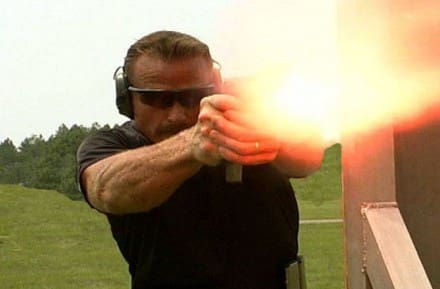We sometimes neglect working on the fundamentals. These are the core skills around which everything rotates. It is sometimes necessary to lie flat on your belly and work basic rifle marksmanship (BRM). Refresh on the importance of building a position to achieve a natural point of aim. Understand that without a natural point of aim, there is muscular input and where there is muscular input there will be movement in the weapon when fired. This will have an adverse effect on the desired impact of the round fired.
When you work BRM, you appreciate external ballistics and the effects that wind, temperature, humidity, and angle have on desired impact.
You develop an understanding that this differs from one round to another depending on the make, grain, caliber, and type of round.
“Single shots should be practiced one round at a time. BRM forces us to concentrate on the fundamentals. These fundamentals should be engraved into our hard drives because as tactical gun handlers we must be able to perform certain skills intuitively.
There are facets that must be felt and performed at a subconscious level. i.e., loading, pre-combat check, safety manipulation, building a position, achieving a natural point of aim, sight alignment, trigger control, feeling the metal on metal imperfections in the trigger group, calling your shot, seeing how far the sight rises, seeing where the sight settles, following through, realigning the sights, and resetting the trigger. These must be practiced in near slow motion.
You must have a firm understanding of minute of angle and the accuracy of your rifle. You must know how your sights adjust. You should have a basic understanding of external ballistics to understand the possible adverse effects caused by winds, temperature, humidity, and angle.
BRM allows the shooter to establish a tempo or demeanor.”
Patrick McNamara
SGM, US Army (Ret)

Patrick McNamara spent twenty-two years in the United States Army in a myriad of special operations units. When he worked in the premier special missions unit, he became an impeccable marksman, shooting with accurate, lethal results and tactical effectiveness. McNamara has trained tactical applications of shooting to people of all levels of marksmanship, from varsity level soldiers, and police officers who work the streets to civilians with little to no time behind the trigger.
His military experience quickly taught him that there is more to tactical marksmanship than merely squeezing the trigger. Utilizing his years of experience, McNamara developed a training methodology that is safe, effective and combat relevant and encourages a continuous thought process. This methodology teaches how to maintain safety at all times and choose targets that force accountability, as well as provides courses covering several categories, including individual, collective, on line and standards.
While serving as his Unit’s Marksmanship NCO, he developed his own marksmanship club with NRA, CMP, and USPSA affiliations. Mac ran monthly IPSC matches and ran semi annual military marksmanship championships to encourage marksmanship fundamentals and competitiveness throughout the Army.
He retired from the Army’s premier hostage rescue unit as a Sergeant Major and is the author of T.A.P.S. (Tactical Application of Practical Shooting).
Gunfighter Moment is a weekly feature brought to you by Alias Training & Security Services. Each week Alias brings us a different Trainer and in turn they offer some words of wisdom.
Tags: Alias Training and Security Services, Pat McNamara, TMACS



Pat, whens Sentinel due out? The teaser was bad ass